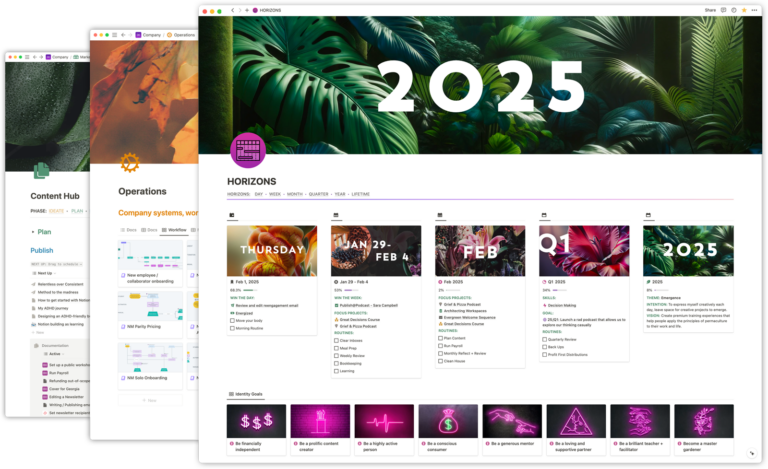Individuals and teams often come to Notion hoping that it is going to solve their productivity problems. Unfortunately, what they’re failing to acknowledge is that they usually have an underlying system problem, not necessarily a productivity or technology problem.
It won’t matter what tools you’re using to execute your work, or how much desire you have to be productive, unless you’ve established a system for getting things done.
Your Notion workspace is only ever going to be as effective as your foundational systems.
Here are some things to consider about your systems before you jump into Notion, or any other tool:
Define your desired outcome.
One statement I like to keep in mind is ‘process before technology’. A system is just a collection of processes. Often we pick a shiny, new tool and try to figure out how to include it in our workflow, rather than designing our system first and selecting tools to incorporate second.
Start by defining what you are trying to accomplish through your system. Be as specific as possible. Think about how you would describe the experience of having a ‘successful’ system.
Outline the path to achieve your desired outcome.
What are the steps you (think) you need to take to get to your desired outcome? This can and will evolve, so just start with a basic, broad overview. Remember that your system is not your tools—what you want to establish right now is the path, independent of the tools that might help you travel it. For example, if your desired outcome is to have an organized knowledge management system that makes it easy to surface notes and connect ideas, the basic path you identify may be: capture resources, process resources, utilize resources, review resources.
Get stakeholders on board.
It’s all too common for teams to operate in silos and forget that their systems often encompass multiple stakeholders. This leads to miscommunication, misunderstandings, and ineffective processes (and thus, systems!). All the folks who will regularly interact with a system should be consulted and included in the process of designing it.
Some questions to ponder:
- Is there consensus amongst stakeholders about how to execute the processes within the system (aka: agreement on the path to reach your desired outcome)?
- Is it clear to everyone what their role is?
- Do individuals understand how their role effects colleagues upstream and downstream from them, and how they can most effectively collaborate?
Once this foundation is established, you can start to consider the tools you might use.
Some questions to think on:
- What parts of the system could be made more efficient, accurate, or automated if supported by technology?
- Are there any parts of the system that benefit from being manual or more ‘high touch’ that would be diminished if tech was implemented?
- Are the tools you’re considering a true fit, or are you trying to force the tools to fit the system?
- Is there consensus amongst stakeholders about what tools to implement?
- Are the majority of relevant stakeholders comfortable with the tools you’re considering? And, if not, will these folks be able to learn the new tools in a timely manner, with relative ease?
- Lastly: are you, or someone on your team, prepared to maintain whatever tools are implemented?
How do you know you’ve established a system that is more than just the shiny tools used to implement it?
A tech agnostic system is one that could continue to operate even if the technology you’re using today suddenly disappeared. Ask yourself: could you translate your current processes and systems to other platforms with relative ease?
If the answer is yes, than you’ve established a system that may be enhanced by your chosen tools, but isn’t necessarily dependent on them.
At Notion Mastery we focus on Notion as a means for managing your business and your life. However, the core concepts we share about productivity, business operation and life management are not specific to Notion. Notion might enhance our workflows, but we can still apply these core concepts to manage our lives and businesses with other tools.

 Notion tips in your inbox
Notion tips in your inbox